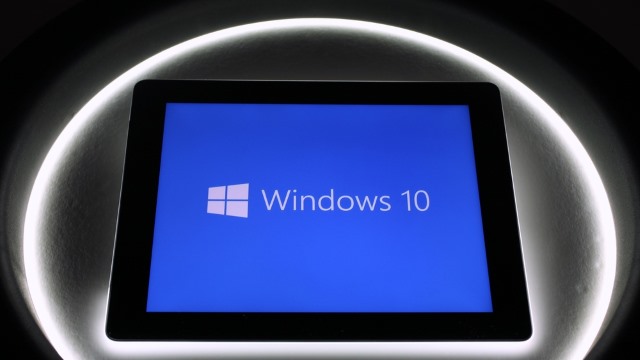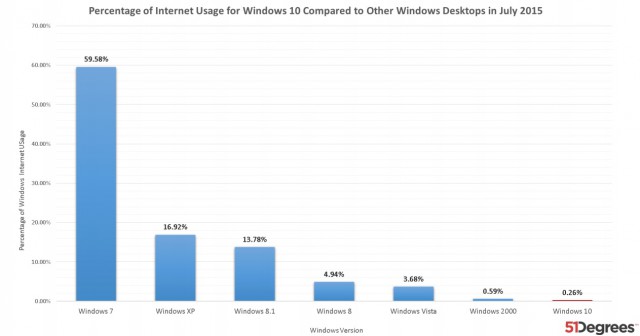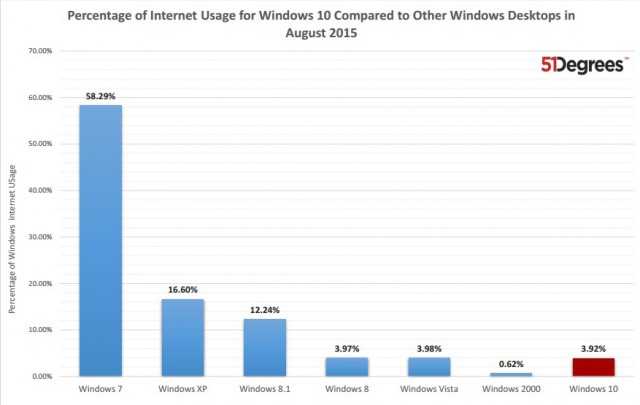
Windows 10 launched globally on 29 July, with Windows 7 and Windows 8.1, as well as Windows Insiders, all receiving free upgrades to the new OS.
Microsoft suggests that Windows 10 has had great initial success with 75 million devices installing the upgrade just four weeks after it was released. The company’s marketing chief, Yusuf Mehdi, said "the operating system is being downloaded and installed faster than any previous version of the platform".
Mehdi also said that more than 90,000 unique PCs and tablet models had been upgraded in 192 countries, Xbox One users had streamed 122 years of gameplay to Windows 10-enabled PCs and the Windows 10 store had experienced six times as many downloads per device compared to Windows 8. This number of initial installs is a far cry from Windows 8 which led to a desperately rushed released of Windows 8.1.
To build a more realistic image of Windows 10 success, 51Degrees, a device detection company, took a look at Windows 10 web usage data alongside its former operating systems; Windows 8.1, Windows 8, Windows 7, Windows Vista, Windows XP and Windows 2000. 51Degrees data supports Microsoft’s notion that a large number of installs have taken place in the first month but sheds light on the journey it has ahead to encourage Windows 7 users to upgrade.

Following initial release a mere 0.26 percent of global web usage on Windows desktop’s took place on Windows 10 in July (see above) -- arguably expected due to its release date and the cautious nature of savvy Windows users. Following a number of tweaks and debug attempts from Microsoft, 3.92 percent of web usage was recorded on Windows 10 devices in August (see below).

Popular gaming service, Steam, has also tracked Windows 10 usage over the last month and seen a significant increase of gamers using the system -- up 13.68 percent since July, bringing total usage to over 17 percent. In comparison, usage of Windows 7 and Windows 8.1 is down a collective 12.8 percent. It could be argued that the gaming community make up a large proportion of the 75 million installs.
51Degrees’ data proves that there has been a large increase in a matter of four weeks but whether the increase echoes 75 million installs is debatable. What is interesting is the level of web traffic that is still recorded from the likes of Windows 7, Windows XP and Windows 8 -- even the unpopular Windows 8 still facilitates 4.94 percent of traffic.
Windows 7, the age old favorite, monopolizes web usage with 58.29 percent, only decreasing by 1.29 percent since the introduction of Windows 10. Although Windows 10 has had an influx of installs over the past four weeks, this could be due to curiosity, not necessarily a story of dedicated Microsoft users who adopt each and every upgrade.
Windows 10’s issues around privacy and disclosure remains and with the Threshold 2 update in the pipeline, giving users more control over what information the operating system shares and the need for increased transparency of patches and updates could be the defining factor in Windows 10’s ongoing success.
75 million installs is a fantastic achievement -- I guess 3.92 percent web usage doesn’t have quite the same ring to it.
James Rosewell is the founder and CEO of 51Degrees.
Published under license from ITProPortal.com, a Net Communities Ltd Publication. All rights reserved.
Photo credit: Stanislaw Mikulski / Shutterstock

